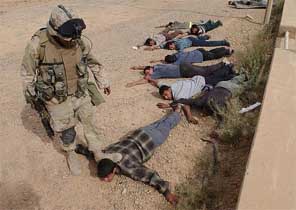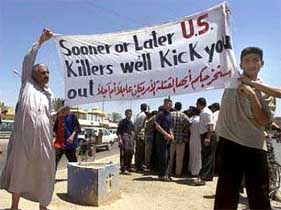Hasan Abu Nimah
The situation in Iraq continues to worsen. Already six months into the occupation, the security situation is so grave that the United Nations secretary general is withdrawing UN staff whose presence there is vital for humanitarian work. In addition to the armed robbers who have been roaming the streets of Iraqi cities, terrorising people since the collapse of the old regime, the resistance is acting indiscriminately, targeting, besides the occupying forces, foreign missions, UN installations, Iraqi police, worshipping places, political figures and members of the Governing Council. With every added day to the already delayed and indeed incapable handling of the growing security problem, the outlaws grow stronger and harder to remove.

There are no visible prospects of any change soon. The two main occupiers, the US and the UK, seem to have stretched their military means to the very limit, and their ongoing efforts at the UN to bolster the occupation by involving other nations’ men and money seem to be discouraged by the large scale of the risk involved and by the reluctance to join the occupiers, rather than, as a UN force, replace them.
Restoring law and order, and maintaining a reasonable level of security are the prerequisites for any planned reconstruction. Both the prerequisite and what follows require huge amounts of money. The occupiers alone cannot provide this money and the other countries that have been asked to contribute are not convinced of the need to do so. Even if the spoken of occupation cost figures of $4 billion a month, for the American forces in Iraq alone, are correct, this is untenable and unbearable. President George Bush has just requested Congress to allocate over $87 billion for continuing operations in Iraq and Afghanistan. Reports from the United States speak of people and leaders objecting to any further military and financial involvement in nation building when the declared war goals were plainly the elimination of the “invisible” weapons of mass destruction and any other, “unproven”, related dangers to American security at home.
But the situation could very well be far worse than that. The chairman of a credible financial firm currently involved in studying the Iraqi situation, the existing industries there and the infrastructure has very recently revealed frightening prospects. He affirmed that there is no infrastructure, no industrial reparable base, and everything has to start from zero. He estimated that the building of the infrastructure alone would cost half a trillion dollars. If you add to that the Iraqi foreign debt, estimated at $400 billion, the final figure becomes impossible to meet by any standards. The oil revenue, even if production is stretched to its maximum capacity, will not cover more than a tiny portion of this burden. And that can only be achieved after the updating and the upgrading of the oil industry itself, already run down as a result of the prolonged embargo, an operation which also needs money and takes time.
The urgency is being enhanced by the day; first, because of the mounting casualties, amongst the American soldiers in particular, as a result of the growing resistance; second, because of the proved failures of the occupation forces to either protect themselves or to establish order in the country; and third because the effect of all this is causing severe damage to the occupier at home, and to the occupied, whose faith in the whole scheme, originally faint, is now running out.

In the face of such a terrible entanglement, any rational assessment would probably opt for disengagement. The United States could, under the guise of having accomplished their mission by removing a terrible dictator and all the threats his regime posed, turn the whole matter to the United Nations, cut its losses and leave, as it did before in Lebanon, in Somalia and, relatively recently, in Afghanistan. That is certainly not an option, because if rational thinking dictates that, compelling practical political considerations do not. For the Americans to withdraw at this stage would simply imply admitting defeat and accepting the failure of the whole project without actually achieving much, despite any claims otherwise. (It is much less of a problem for the British, though, because they were followers not initiators.) The consequences of such a hypothetical eventuality, at home and on the international scene, would be a certain irreparable disaster.
A second option would be what Washington has been trying at the UN, although with little success so far, to create a novel formula whereby the Security Council allows the formation of a multinational force under UN name but under US command, to share the heavy financial and security burdens with the original occupiers. It is very unlikely that this attempt will succeed, although the US has been moving closer to its opponents at the international organisation. Secretary of State Colin Powell has recently given the Iraqis six months to produce a constitution and have it approved. Washington had earlier replied to all calls from the other Security Council permanent members to turn the authority over to the Iraqis by insisting that there should be a constitution and an elected government in Iraq first. Powell’s offer could only be viewed as an American desire to speed up the process. The Iraqis themselves have asked for no less than one full year to produce a constitution.
In the event of any possible compromise at the UN, yielding the required multinational force, the prospects of any qualitative change in either the security or the living conditions in Iraq remain bleak. The risks of the resisting Iraqis seeing the additional forces no more than additional occupiers remains real. A vague formula may not be able to sell well as the suspicions are too high to be dealt with so naively and simplistically.
The third option ahead of the occupiers is to continue to desperately mobilise every possible effort to keep the project going until a miracle happens and the tide turns. It will not, and miracles do not happen. Every attempt at extricating oneself from such a quagmire will end up sinking deeper. Maybe all efforts will have to be totally exhausted and huge losses sustained before submitting to the imperatives of history, as well as logic, becomes unavoidable. At that point, the defeat cannot be disguised and the disastrous consequences cannot be reversed. The departure of the occupiers at that point will be hasty and disorderly, and it will leave a country transformed from dictatorship to eternal chaos. Delaying the inevitable always makes matters worse, and this is one more case.
This is a war which millions around the world, including myself, argued was illegal and wrong. It would have disastrous consequences for its makers and for the occupied. They argued that it will create many more problems than it will solve. The argument against the war was never meant to be an argument for the removed Iraqi regime. What we have experienced so far in this entire region, and in the occupied Palestinian territories in particular, is no more than the tip of the iceberg. God help us cope with the upcoming consequences and disasters.
Published in The Jordan Times